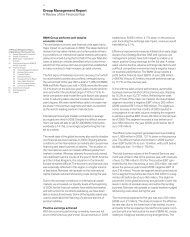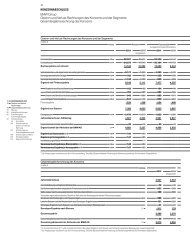Global Compact Case Study 2002 - BMW Group
Global Compact Case Study 2002 - BMW Group
Global Compact Case Study 2002 - BMW Group
Create successful ePaper yourself
Turn your PDF publications into a flip-book with our unique Google optimized e-Paper software.
May <strong>2002</strong><br />
updated<br />
February 2005<br />
<strong>BMW</strong> CleanEnergy Project.<br />
<strong>Global</strong> <strong>Compact</strong> <strong>Case</strong> <strong>Study</strong> <strong>2002</strong>.<br />
<strong>BMW</strong> CleanEnergy Project<br />
The following summarizes the <strong>BMW</strong> <strong>Group</strong>’s ”CleanEnergy Project” which we<br />
submit to the <strong>Global</strong> <strong>Compact</strong> Learning Forum as our Best Practice <strong>Case</strong> <strong>Study</strong>.<br />
This case study reflects three of the <strong>Global</strong> <strong>Compact</strong>’s nine principles:<br />
Principle 7: Support a precautionary approach to environmental challenges<br />
Principle 8: Undertake initiatives to promote greater environmental<br />
responsibility;<br />
and most of all<br />
Principle 9: Encourage the development and diffusion of environmentally<br />
friendly technologies<br />
While the <strong>BMW</strong> <strong>Group</strong> is convinced that the example of best practice chosen<br />
also reflects Principles 7 & 8, we are most proud of the results produced<br />
regarding the development and diffusion of environmentally friendly technologies,<br />
encompassed in Principle 9 of the <strong>Global</strong> <strong>Compact</strong>.<br />
Introduction<br />
Mobility is life. Mobility offers the chance for a high standard of living, quality of life<br />
and economic strength. For the individual, mobility means personal freedom<br />
while for the economy it means prosperity. Mobility, or its resulting traffic, helps<br />
reduce the disadvantages emanating from this world’s inequalities, for example<br />
the unequal distribution of resources in the different regions, for the better of us<br />
all. Thus it is that mobility and freedom are closely linked.<br />
Mobility takes on many forms. For the <strong>BMW</strong> <strong>Group</strong>, today’s mobility is based on<br />
the automobile. It is our most important means of mobility – for the individual, the<br />
public and for the economy as a whole. All forms of mobility require energy.<br />
Today, and in the near future, this is the energy generated from fossil fuels:<br />
predominantly from crude oil. However, fossil energy has two crucial<br />
disadvantages:<br />
the supplies are finite - in the not too distant future a very large proportion of the<br />
energy needed in our society will have to come from renewable sources<br />
and<br />
when it is utilized (in the combustion process) carbon dioxide (CO 2 ) is produced<br />
which has an effect on the aggravation of the global climate situation (the<br />
natural ”greenhouse effect”).<br />
<strong>BMW</strong> <strong>Group</strong>
<strong>BMW</strong> CleanEnergy Project.<br />
<strong>Global</strong> <strong>Compact</strong> <strong>Case</strong> <strong>Study</strong> <strong>2002</strong>.<br />
For these reasons, one objective has become consistently ever more important<br />
for the <strong>BMW</strong> <strong>Group</strong> as an automobile manufacturer: to abandon the<br />
consumption of finite energy sources, that means to switch to sustainable forms<br />
of energy and to reduce drastically CO 2 -emissions.<br />
The realization of this objective will call for an enormous economic, strategic and<br />
political strength that can only be mastered by a broad-based social alliance. This<br />
example of best practice for the United Nations <strong>Global</strong> <strong>Compact</strong> Learning Forum<br />
website shall be seen as another small step towards this alliance.<br />
What triggered the ”CleanEnergy Project”?<br />
Considering the abovementioned finite nature of fossil fuel resources and the<br />
aggravation of the global climate situation, the <strong>BMW</strong> <strong>Group</strong> started as early as<br />
the 70’s to think about how mobility (as a basic human need and a prerequisite of<br />
prosperity) can be sustainably provided in the future. This has led to a level of<br />
expertise that, in alignment with <strong>BMW</strong>’s reputation as a driver of innovation,<br />
culminated in the ”<strong>BMW</strong> CleanEnergy Project”.<br />
For the <strong>BMW</strong> <strong>Group</strong>, ”CleanEnergy” means closing the loop for zero CO 2<br />
emissions. The technical process for this is: water to hydrogen and back to water.<br />
When used in vehicles, hydrogen is converted back into vapour and returned to<br />
the atmosphere. One of the most important challenges will be the production of<br />
hydrogen from renewable resources such as wind, solar or hydro energy, this will<br />
transform our current economic system that is based on ”once-off consumption”<br />
of resources into one based on their reuse. At the <strong>BMW</strong> <strong>Group</strong>, using the<br />
detailed ”well to wheel” analysis process, we can ensure that we are not just<br />
transferring emissions from fuel consumption stage to fuel production stage. As<br />
we understand the CleanEnergy-System we feel responsible to ensure the<br />
implementation of production, distribution and application of hydrogen based on<br />
renewable energies.<br />
In addition to the obvious effect of strengthening the <strong>BMW</strong> brand in a highly<br />
competitive market, there is another side effect to this development: the <strong>BMW</strong><br />
<strong>Group</strong> prepares itself for internal and external requirements expected to be even<br />
more stringent than current ones: e.g. the Kyoto Protocol 1997, the Association<br />
of European Automobile Manufacturers (ACEA) CO 2 self-commitment to the<br />
European Commission or the California Zero Emission Vehicle Legislation.<br />
For more information on the background of these developments please refer to<br />
<strong>BMW</strong> <strong>Group</strong>’s environmental policy at www.bmwgroup.com/responsibility.<br />
<strong>BMW</strong> <strong>Group</strong>
<strong>BMW</strong> CleanEnergy Project.<br />
<strong>Global</strong> <strong>Compact</strong> <strong>Case</strong> <strong>Study</strong> <strong>2002</strong>.<br />
Further information on how the <strong>BMW</strong> <strong>Group</strong> seeks to reduce the use of nonrenewable<br />
resources in the area of design for the environment, with regard to<br />
production practices and concerning <strong>BMW</strong> <strong>Group</strong>’s approach to end-of-life<br />
vehicles please refer to the Sustainable Value Report,<br />
www.bmwgroup.com/sustainability.<br />
What actions have been taken?<br />
As the vehicles of the future will not be using the same fuels as today, <strong>BMW</strong><br />
started preparing itself quite early for this challenge. For decades key <strong>BMW</strong><br />
research projects have been anticipating this development – experimental<br />
vehicles designed for everyday use as well as series models with power units<br />
based on alternative fuels provide ample evidence of <strong>BMW</strong>’s development<br />
expertise. The following examples of actions taken represent just the main<br />
milestones of the many steps taken since <strong>BMW</strong> first started the quest for<br />
sustainable mobility:<br />
Shift away from fossil fuels via natural gas technology (<strong>BMW</strong> <strong>Group</strong> as the first<br />
European supplier of natural gas-fuelled series cars: the 316g <strong>Compact</strong> on the<br />
market in 1995) towards hydrogen technology (<strong>BMW</strong> <strong>Group</strong> is in the serial<br />
development of a production car with a hydrogen combustion engine which will<br />
be offered to customers during the production period of the current <strong>BMW</strong> 7<br />
Series).<br />
Networking with industry partners for developing a global sustainable (in other<br />
words ecological, social responsible and economically viable) hydrogen<br />
infrastructure. Further, the <strong>BMW</strong> <strong>Group</strong> has been supporting the global<br />
distribution of hydrogen and its application in a variety of mobile and stationary<br />
processes in order to facilitate a leading role in the field of hydrogen car<br />
technology.<br />
One such project is the ”VES Verkehrswirtschaftliche Energiestrategie” (TES<br />
Transport Energy Strategy). This joint initiative by the <strong>BMW</strong> <strong>Group</strong> and<br />
DaimlerChrysler with the German Federal Ministry of Transport, Building and<br />
Housing (including others such as ARAL, BP, General Motors, MAN, RWE, Shell<br />
and Volkswagen) was designed to craft a common strategy between government<br />
and both the automotive and energy industries for reducing the dependency on<br />
crude oil, optimising fossil resources use, and lowering polluting emissions<br />
especially CO 2 through replacement with alternative fuels on a large scale. This<br />
project also prepared field tests that included supply to customers.<br />
<strong>BMW</strong> <strong>Group</strong>
<strong>BMW</strong> CleanEnergy Project.<br />
<strong>Global</strong> <strong>Compact</strong> <strong>Case</strong> <strong>Study</strong> <strong>2002</strong>.<br />
The ”Hydrogen Project Airport Munich” is the first fully automated public<br />
Hydrogen Filling Station at the Munich Airport. This project is designed to<br />
demonstrate the feasibility for potential customers and is financially supported by<br />
the Bavarian Ministry for Economy, Traffic and Technology.<br />
Along with nine partners and support from the European Commission, the<br />
<strong>BMW</strong> <strong>Group</strong> founded the ”European Integrated Hydrogen Project ” to develop a<br />
dual-approach strategy for hydrogen- top-down to provide assistance in framing<br />
the necessary legislation and bottom-up to develop the necessary technology.<br />
In 2001, the <strong>BMW</strong> <strong>Group</strong> set off with the full fleet of hydrogen cars on the<br />
CleanEnergy WorldTour. The CleanEnergy WorldTour concept is to globally<br />
raise awareness and build up a long-term stable political framework for a vision of<br />
a sustainable future, based on a hydrogen economy and society (as opposed to<br />
an oil-economy and society). Each location stop-over of the CleanEnergy<br />
WorldTour provided different focus depending on the location (e.g. possibility of<br />
hydrogen generation through renewable solar energy in Dubai, zero emission in<br />
Los Angeles, European political framework in Brussels).<br />
On an educational front, the <strong>BMW</strong> <strong>Group</strong> has implemented distribution of<br />
learning material for schools, which allows them to educate the students<br />
regarding sustainable energy and the possibilities about a future hydrogen-based<br />
economy. This material is currently available in German, English and Mandarin.<br />
Since 2003, the <strong>BMW</strong> <strong>Group</strong> displays tomorrow’s hydrogen mobility in the<br />
traffic centre of the Deutsches Museum in Munich. As a founder member of the<br />
traffic centre, the <strong>BMW</strong> <strong>Group</strong> underlines its commitment to the hydrogen<br />
technology in both an interesting and entertaining exhibition.<br />
Already in the year 2000, the cooperation between the Deutsches Museum and<br />
the <strong>BMW</strong> <strong>Group</strong> led to a large display of CleanEnergy in the framework of the<br />
EXPO project.<br />
In 2004, the <strong>BMW</strong> <strong>Group</strong> launched the CleanEnergy project in China. In<br />
conjunction with the Science & Technology Museum in Beijing, the <strong>BMW</strong> <strong>Group</strong><br />
opened a CleanEnergy exhibition. It showed the complete hydrogen cycle and<br />
provided an interactive and informal means of experiencing and learning about<br />
the production, distribution and application of hydrogen.<br />
On September 19 th 2004, the hydrogen race car <strong>BMW</strong> H 2 R set up 9 records on<br />
the Miramas proving grounds. The homologation of the records is subject to FIA<br />
recognition. Highlighted by a top speed above 300 km/h, the <strong>BMW</strong> <strong>Group</strong> has<br />
clearly proven its conviction that hydrogen is able to replace conventional fuel<br />
without requiring the driver to make the slightest compromise in terms of<br />
dynamic, up-to-date performance.<br />
<strong>BMW</strong> <strong>Group</strong>
<strong>BMW</strong> CleanEnergy Project.<br />
<strong>Global</strong> <strong>Compact</strong> <strong>Case</strong> <strong>Study</strong> <strong>2002</strong>.<br />
<strong>BMW</strong>'s motive in setting up these records was not only to prove the power and<br />
performance the hydrogen combustion engine is able to offer. Rather, the<br />
reliability and durability of the technology used clearly demonstrates the<br />
supremacy of <strong>BMW</strong> in developing the hydrogen combustion engine to<br />
production standard.<br />
Together with German government representatives and project partners of the<br />
Clean Energy Partnership (CEP), the <strong>BMW</strong> <strong>Group</strong> opened the German capital’s<br />
first public hydrogen filling station at the end of 2004. The involvement in the<br />
CEP Berlin is part of the <strong>BMW</strong> <strong>Group</strong>’s involvement in setting up an<br />
infrastructure for hydrogen vehicles.<br />
All of these actions are not only taking place company wide, they extend beyond<br />
the borders of the <strong>BMW</strong> <strong>Group</strong>, reaching out in every area of the society – and<br />
are to be seen in the light of a very broad-based approach to environmental<br />
protection: For example <strong>BMW</strong> <strong>Group</strong> being the first automobile manufacturer<br />
since 1999 to have bespoken certified Environmental Management Systems in<br />
all plants worldwide. For other examples of the involvement of every associate<br />
within the <strong>BMW</strong> <strong>Group</strong> as well as e.g. our suppliers please refer to <strong>BMW</strong> <strong>Group</strong>’s<br />
Sustainable Value Report at www.bmwgroup.com/sustainability.<br />
But those actions mentioned above are not where it stops: The Board of<br />
Management has decided to follow on the results of these actions into the<br />
product development process to produce series models with hydrogen engines<br />
whilst at the same time developing the necessary infrastructure. The target we<br />
have set for ourselves is to bring an hydrogen 7 Series onto the market within the<br />
production cycle of the present model - this can be seen more as a revolution<br />
towards hydrogen instead of an evolutionary step towards hydrogen!<br />
Who was involved?<br />
Here a few examples of the partners in the various facets of the CleanEnergy<br />
project:<br />
Industry partners include:<br />
in the ”VES Verkehrswirtschaftliche Energiestrategie” (TES Transport Energy<br />
Strategy) the <strong>BMW</strong> <strong>Group</strong> together with ARAL, BP, DaimlerChrysler, General<br />
Motors, RWE, including the German Federal Ministry of Transport, Building and<br />
Housing.<br />
<strong>BMW</strong> <strong>Group</strong>
<strong>BMW</strong> CleanEnergy Project.<br />
<strong>Global</strong> <strong>Compact</strong> <strong>Case</strong> <strong>Study</strong> <strong>2002</strong>.<br />
In the Pilot Project ”Clean Energy Partnership” (CEP) to set up the hydrogen<br />
infrastructure (production, distribution, application) involving the <strong>BMW</strong> <strong>Group</strong><br />
together with ARAL/BP, DaimlerChrysler, Linde, General Motors, Ford and<br />
others, supported by the German Federal Ministry of Transport, Building and<br />
Housing. In the ”Hydrogen Project Airport Munich” the <strong>BMW</strong> <strong>Group</strong> together<br />
with ARAL, Bayerngas, Linde, MAN, Mannesmann, MTU, Proton, Siemens, E-<br />
ON Energie as well as the State of Bavaria.<br />
In the ”European Integrated Hydrogen Project EIHP” the <strong>BMW</strong> <strong>Group</strong> together<br />
with Air Liquide, BP, DaimlerChrysler, Det Norske Veritas, Ford, Messer<br />
Griesheim, Norsk Hydro, Shell, Volvo and Raufoss.<br />
Consultancies include:<br />
TÜV Süddeutschland Holding AG, LBST Ludwig Bölkow Systemtechnik,<br />
Forum für Zukunftsenergien and others.<br />
Universities and other Research Institutes include:<br />
FfE Forschungsstelle für Energiewirtschaft,<br />
Institute for Mobility Berlin and others.<br />
Others:<br />
The <strong>BMW</strong> <strong>Group</strong> is in constant contact to third parties through its participation in<br />
different working groups and pursues continuous contacts to politicians and<br />
governmental organizations.<br />
One might ask how <strong>BMW</strong> <strong>Group</strong> deals with the competitive business-tobusiness<br />
issues that may arise from such a network of contributing partners. The<br />
answer for us at the <strong>BMW</strong> <strong>Group</strong> is quite simple: The implementation of a new<br />
economy based on hydrogen necessitates a paradigm shift. The first steps in this<br />
process concerning the change of energy production and supply are for the<br />
benefit of all parties involved, so this is not so much a competitive environment at<br />
this point in time.<br />
This of course might not apply for other partners such as e.g. energy suppliers.<br />
To answer this question on their behalf one might state that it is important to<br />
remain a player in this new challenge and thereby ensure future market presence<br />
– but even for them competition is not so much an issue.<br />
<strong>BMW</strong> <strong>Group</strong>
<strong>BMW</strong> CleanEnergy Project.<br />
<strong>Global</strong> <strong>Compact</strong> <strong>Case</strong> <strong>Study</strong> <strong>2002</strong>.<br />
How is progress measured?<br />
To keep track on the results achieved so far the <strong>BMW</strong> <strong>Group</strong> follows up on<br />
internal milestones and review points within the project plan, as well as the<br />
normal gateways in the automobile process development management. In<br />
addition, the <strong>BMW</strong> <strong>Group</strong> regularly conducts market research to assess projectrelated<br />
trends in society. As one of the outcomes a shift of perception can be<br />
noticed: <strong>BMW</strong> <strong>Group</strong>’s corporate image improved with regard to innovation, but<br />
also concerning environmental responsibility.<br />
A status report of the <strong>BMW</strong> CleanEnergy project as well as the next mid-term<br />
goals such as the availability of a hydrogen powered model of the new 7 Series<br />
for the market or the implementation of hydrogen filling stations can be obtained<br />
at www.bmw.com/cleanenergy.<br />
Costs and benefits<br />
With regard to costs one must note that, as we speak, we are in the transition<br />
phase ”from lab to industrial development process”. For the <strong>BMW</strong> <strong>Group</strong> this<br />
project is part of a long-term strategic investment providing evidence for mobility<br />
in the future. Therefore it is clear that at the end of the day the return must justify<br />
the investment as in every other business.<br />
A lot of research has been done with regard to the benefits of such a technology,<br />
e.g. first quantifications of possible emission reductions were researched in the<br />
TES (Transport Energy Strategy): This initiative had the objective to define a<br />
reliable fuel supply with significant CO 2 -reductions, in more detail<br />
satisfy at least 30% of Europe’s road-vehicle requirements for a period of 50<br />
years,<br />
reduce traffic-related CO 2 -emissions in the entire chain ”well-to-wheel” at least<br />
20% for alternatively fuelled passenger cars, 10% for alternatively fuelled<br />
commercial vehicles,<br />
maintain acceptable fuel and vehicle costs.<br />
Under those prerequisites it was established with which amount of CO 2<br />
emissions and for which costs hydrogen can be generated through renewable<br />
energies. Now depending on the degree of substitution of today’s fossil fuel such<br />
as petrol by hydrogen different scenarios were developed, e.g. starting from<br />
2,5% via 15% within 10 years up to 30% in 2050 (see ”TES - An Initiative for<br />
Tomorrow’s Fuel”, in ”Energies of Change - The Hydrogen Solution”, Editor<br />
Carl-Jochen Winter, Gerling Akademie Verlag, 2000, Munich, Germany).<br />
<strong>BMW</strong> <strong>Group</strong>
<strong>BMW</strong> CleanEnergy Project.<br />
<strong>Global</strong> <strong>Compact</strong> <strong>Case</strong> <strong>Study</strong> <strong>2002</strong>.<br />
What have we learned?<br />
One thing the <strong>BMW</strong> <strong>Group</strong> learned from this research is: The public demand is<br />
very high for government and policies to create stable and reliable framework<br />
conditions for such an innovative approach to a sustainable mobility for the<br />
future.<br />
Besides the normal challenges that occur in such a project that includes partners<br />
which are partly competitors, the key technical challenges remaining are<br />
concerning the implementation of the infrastructure. One of the challenges being<br />
the so-called ”chicken-or-egg-discussion”: Whereas the oil industry will not<br />
commit to building the hydrogen infrastructure without the commitment of the<br />
car manufacturers to introduce a significant amount of hydrogen-fuelled vehicles<br />
to the market, in return the automobile industry will not commit to produce such<br />
vehicles in large numbers without having the necessary infrastructure to provide<br />
fuel. However all industries involved require certain long-term stability with regard<br />
to the political framework to be able to plan for the decades ahead.<br />
The biggest obstacle still to overcome is likely to be the costs. One could<br />
compare the development stage of hydrogen as a fuel with the development of<br />
the combustion engine at the time of its first application in an automobile. On the<br />
one hand hydrogen as a fuel for automobiles is very much in its infancy and on<br />
the other hand the current infrastructure is completely implemented to support<br />
fossil fuels. This means that only with a broad alliance of all parties involved -<br />
research, production, finance, insurance and policy can a shift in technology be<br />
achieved, which will be a feasible and convenient alternative for our customers.<br />
Another thing that we learned about the challenges and successes in working to<br />
diffuse this technology came as we went along with the <strong>BMW</strong> CleanEnergy<br />
Project: From our research activities as well as from the different awareness<br />
actions like discussions, presentations, exhibitions, brochures, requests for<br />
information and last but not least the <strong>BMW</strong> CleanEnergy WorldTour we learned<br />
that there is an immense need for information about this technology. This lead us<br />
to create – together with educationalists – didactic learning material for schools,<br />
describing the whole context of the CleanEnergy-System. This material is<br />
currently available in German, English and Mandarin language versions.<br />
<strong>BMW</strong> <strong>Group</strong>
<strong>BMW</strong> CleanEnergy Project.<br />
<strong>Global</strong> <strong>Compact</strong> <strong>Case</strong> <strong>Study</strong> <strong>2002</strong>.<br />
Key lessons which could be useful to other companies:<br />
We hope that the <strong>BMW</strong> CleanEnergy Project as a Best Practice case study,<br />
which highlights both the enormous potential for change as well as the<br />
challenges ahead, provides many lessons for other companies. Hopefully other<br />
companies may also gain information from this case study, which will motivate<br />
them to support our or other comparable initiatives.<br />
Certainly, some of the main learning points include:<br />
the high degree of networking with partners: e.g. oil industry, energy suppliers,<br />
development partners, suppliers, politicians,<br />
practicing open communication with all parts of society involved, thereby<br />
generating public awareness, creating motivation and commitment in many<br />
areas,<br />
enabling technology transfer - especially for significant, even still confidential<br />
cutting-edge technologies.<br />
Even more so, this applies as well to all mechanisms facilitating knowledge and<br />
technology transfer successfully inside the company.<br />
Conclusion<br />
In the introduction of this case study the <strong>BMW</strong> <strong>Group</strong> stated the fact that one<br />
objective became more and more important for the <strong>BMW</strong> <strong>Group</strong> as an<br />
automobile manufacturer - to abandon the consumption of finite energy<br />
sources, switch to sustainable forms of energy and reduce CO 2 emissions. In<br />
order to achieve this, ”carbon reduction” of the fuel is key to a sustained longterm<br />
reduction in CO 2 – the less carbon a fuel contains, the less CO 2 is<br />
generated during combustion for the same amount of energy.<br />
A further reduction in the amounts of other legally limited exhaust components<br />
is a welcomed side effect. On this point hydrogen is the ideal fuel since it does<br />
not contain any carbon at all. Above that it is available in almost infinite quantities<br />
as a chemical constituent of water and can be separated out, stored and<br />
transported on a large scale. There are therefore no environmentally relevant<br />
side effects of using hydrogen obtained through regenerative processes.<br />
Hydrogen obtained through a regenerative process such as wind, solar or hydro<br />
energy will transform our current ”once-off consumption” economic system into<br />
one based on the reuse of resources.<br />
<strong>BMW</strong> <strong>Group</strong>
<strong>BMW</strong> CleanEnergy Project.<br />
<strong>Global</strong> <strong>Compact</strong> <strong>Case</strong> <strong>Study</strong> <strong>2002</strong>.<br />
This provides a secure basis for both the economy where jobs are depending on<br />
transport and for personal mobility which allows for the freedom of the individual –<br />
all this without any negative effects on the climate. Regenerative production of<br />
hydrogen will therefore make an important contribution to ”sustainable mobility”.<br />
Energy supply, transport and traffic are not only of national, but also of international<br />
importance. The gradual implementation of a stable hydrogen-based system as an<br />
alternative to our current conventional fossil fuel based economic system can only<br />
take place on a global scale and requires the necessary infrastructure.<br />
This is why the <strong>BMW</strong> <strong>Group</strong> is looking for partners worldwide e.g. in the<br />
automotive industry, oil industry and on the political level that want to engage with<br />
us on this process. In cooperation with its industry partners, the <strong>BMW</strong> <strong>Group</strong><br />
intends to ensure that a comprehensive network will be established in the near<br />
future. The <strong>BMW</strong> <strong>Group</strong> is nearly ready to begin series production of vehicles that<br />
can run on hydrogen.<br />
A prerequisite of this is that all partners share the same vision and are convinced of<br />
the path forward. Therefore the <strong>BMW</strong> <strong>Group</strong> is keen to continually have our<br />
strategies analysed and judged by experts. It is precisely due to this desire for<br />
transparency and openness that the <strong>BMW</strong> <strong>Group</strong> has chosen the CleanEnergy<br />
Project to be submitted to the Learning Forum of the United Nations <strong>Global</strong><br />
<strong>Compact</strong>.<br />
<strong>BMW</strong> <strong>Group</strong>


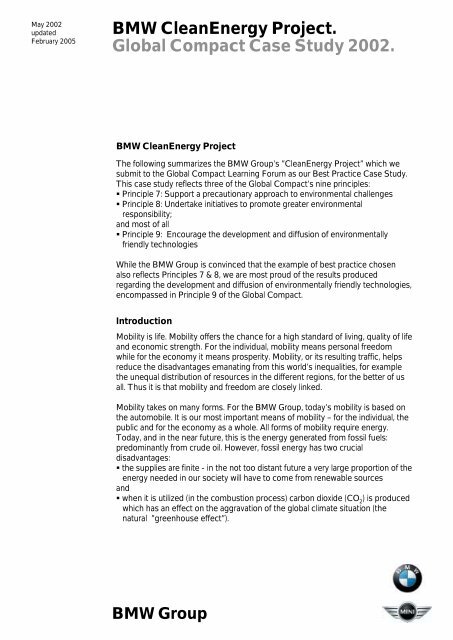
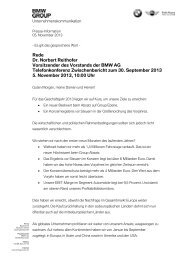
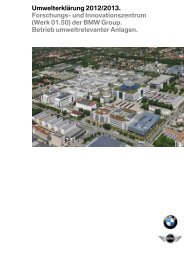
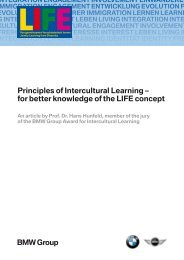
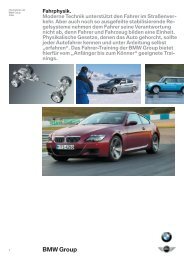
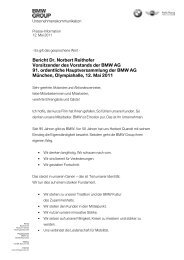
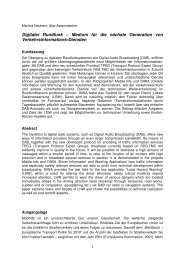
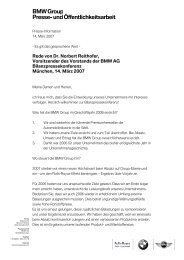
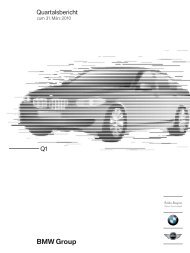
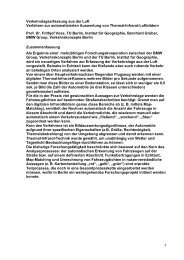
![Vollständiger Bericht [PDF] - BMW Group](https://img.yumpu.com/20706531/1/190x238/vollstandiger-bericht-pdf-bmw-group.jpg?quality=85)



